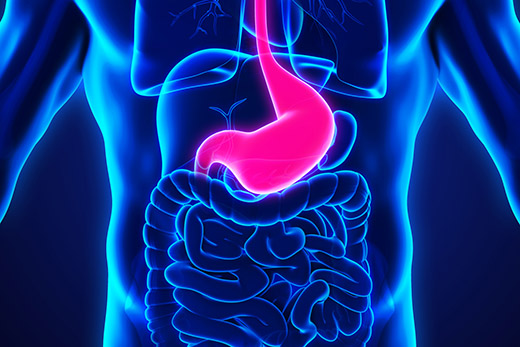A minimally invasive procedure at Emory University Hospital is showing promise in patients with gastroparesis, a digestive disorder in which the stomach does not empty food in a normal manner. The results of two small Emory studies were presented recently at the American College of Gastroenterology (ACG) in Las Vegas, where the researchers accepted the 2016 ACG Governor’s Award for Excellence in Clinical Research and the ACG Presidential Poster Award.
Gastroparesis occurs in diabetic patients and other patients with no underlying causes, where the muscles of the stomach and intestines do not properly function. Food then moves slowly or stops moving through the digestive tract.
In one study, Emory researchers performed a retrospective review of data in 10 patients who underwent gastric peroral endoscopic pyloromyotomy or G-POEM for gastroparesis. G-POEM involves guiding a small knife through an endoscope into the submucosal tunnel. Once there, an incision is made in the pyloric ring muscle to release the tightness of that muscle and normalize gastric emptying.
"In these 10 patients, clinical success was defined by improvement of symptoms measured with a decrease in the Gastroparesis Cardinal Score Index (GCSI) and no recurrent hospitalization," says Sunil Dacha, MD, assistant professor of medicine in the Division of Digestive Diseases, Emory University School of Medicine, and a former advanced endoscopic fellow with Qiang Cai, MD, professor of medicine in the Division of Digestive Diseases at Emory, who is an expert in the minimally invasive procedure. "We found G-POEM was clinically successful in eight of the 10 patients (80 percent) with a decrease in mean GCSI from 30.1 prior to the procedure to 12.8 at follow-up."
Gastric emptying studies were obtained on seven of the 10 patients following G-POEM. Results showed gastric emptying had normalized in five patients and improvements were noted in two other patients. Mean four-hour gastric retention decreased from 62.5 percent to 25.4 percent after G-POEM, indicating the stomach emptied much faster at four hours after a meal. A follow-up questionnaire also highlighted significant improvement in quality of life in several areas.
One patient in the study had no response and required hospitalization 15 days after G-POEM and another patient showed no improvement in symptoms.
A second study, presented at the ACG by Abhinav Koul, MD, a former Emory medical resident who worked with Cai, detailed three patients with gastroparesis who had failed gastric electrical stimulation, but showed improvement following G-POEM. Electrical stimulation of the gastric nerves by a small implantable device is one treatment option for patients with gastroparesis. In this retrospective study, Emory researchers determined G-POEM can be performed safely as a salvage therapy for patients with gastroparesis who failed treatment with a gastric stimulator.
The study also found G-POEM improved symptoms (mean GCSI decreased by an average of 64 percent from 27 to 10) as well as gastric emptying (60.6 percent to 18.3 percent mean average) in these patients. However, more data is needed to further define the role of G-POEM in this challenging patient population. Koul is now a clinical assistant professor at the Medical College of Georgia-UGA Medical Partnership at Athens Regional Medical Center.
"G-POEM is showing some positive results as an additional therapeutic modality for patients with gastroparesis who suffer with delayed gastric emptying," says Cai, who also serves as the director of the Advanced Endoscopy Fellowship at Emory. "We are only one of a few centers in the U.S. offering this specialized procedure."
In 2012, Cai started the POEM procedure at Emory University Hospital for patients with achalasia, a disorder of the esophagus that causes swallowing difficulties. He then developed the G-POEM program at the hospital, in hopes of finding alternative treatments for patients with gastroparesis.

